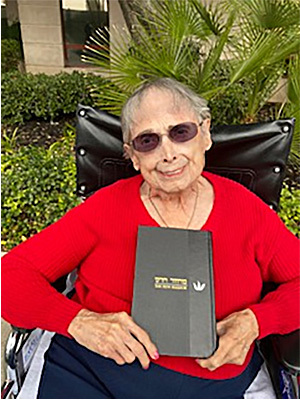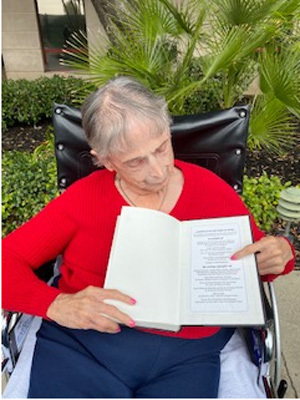Unraveling the Machzor Mystery


Unraveling the Machzor Mystery
When Los Angeles Jewish Home resident Barbara Young Leff attended a Shabbat service at the Home this fall, she could never have imagined it would connect her to her beloved family thousands of miles away. Yet, that is precisely what happened in a story that proves it is, indeed, a small world after all.
As she arrived at services that Friday night, Barbara was provided a machzor (prayer book) and opened it to follow along with the liturgy. What she found on the inside cover was astonishing: a dedication from her first cousins Fred and Judi Young of Yardley, Pennsylvania, a town located on the Delaware River about 30 miles outside of Philadelphia.
She immediately told her son, Steve Leff, and his wife, Cheryl. "When she told us about the label in the prayer book, we couldn't believe it," recalls Barbara's son, Steve Leff. "I thought, ‘Well, that's a coincidence; it must be another Fred and Judi."

But Barbara was insistent, pointing out that the dedication also mentioned Congregation Brothers of Israel—Fred and Judi Young's synagogue. As Steve's wife Cheryl noted, that greatly diminished the possibility it was a different couple with the same name. "To get to the bottom of it, we reached out to Fred and Judi to investigate," she says.
Barbara's and Fred's fathers were brothers, and though Barbara's family had moved from Pittsburgh to Los Angeles in the 1940s, the Leffs and the Youngs remained close, traveling back and forth for family visits and celebrations. Cheryl and Steve were still in touch with their cross-country cousins and quickly emailed them about Barbara's find.
What they learned was that the Youngs had a history of dedicating prayer books as a way of supporting their synagogue. "We've belonged to our shul for 35 years; I'm a past president, and Judi served as president of the temple sisterhood for nearly a decade," Fred says. "Every few years, congregants are asked to donate to fund the purchase of new machzorim. So, we'd definitely done what Barbara said—but we had no idea how the books would have made it all the way out to California."
Solving the rest of the "machzor mystery" would be the job of the Jewish Home's rabbi and chief mission officer, Karen Bender. Cheryl contacted her and laid out the facts of the still-incomplete story—and Rabbi Bender was ready with the missing piece.
When new editions of prayer books are released, synagogues may decide to update their supply. Some then offer their old books to other synagogues, nursing homes and places in need. Such was the case with Congregation Brothers of Israel, which had placed an ad that was subsequently seen by the Jewish Home's Rabbi Ron Goldberg. He brought it to Rabbi Bender's attention, who was delighted with the prospect of acquiring new machzorim for the Home.

"Their synagogue was giving away exactly the machzorim we needed, and they were in excellent condition. In fact, they were actually an update for us, which was fantastic," Rabbi Bender says. "The books were free; we just had to pay the price of shipping the freight here to LA."
"What are the odds that, of all the prayerbooks in the world, my cousin Barbara in California would end up with one that we had dedicated, across the country, years before?" Fred asks. "I said to Judi, ‘We should go out and buy a bunch of lottery tickets right now!'"
As unlikely as the story was, Steve says it was, in some ways, fitting. "My mom, who has a master's degree in library science from USC, was the creator and first director of the Stephen S. Wise Temple library. Books—particularly Judaic books—have always been a huge part of her life," he says. "It seems appropriate that this small-world story would revolve around the dedication in a Jewish book!"
Fred concurs. "When I first heard about it, I assumed Barbara had opened the cover to see if the book was overdue—like a librarian's instinct!" he laughs.
Not long after Barbara's initial discovery, Rabbi Bender presented a copy of the machzor to Barbara to keep as her own. Barbara's pleasure was evident, and she beamed from ear to ear.
"Last time we saw her, she was carrying the book around and explaining the whole story to her doctor," Cheryl says. "She was thrilled by it all and will readily share the tale with anyone who will listen!"